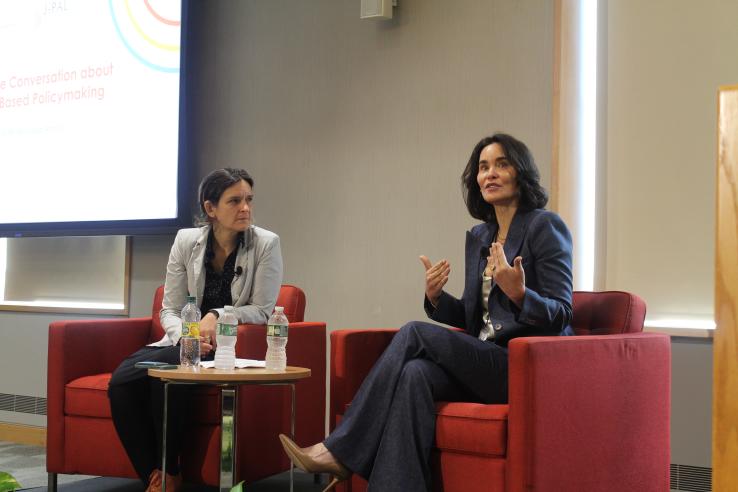July 2024 North America Newsletter

This month, we are excited to announce a major investment by our long-time donor and partner, Arnold Ventures, that will enable J-PAL North America to improve lives at an even more significant scale by supporting rigorous research and advancing evidence-based policymaking. We are incredibly humbled by this generous funding, which will allow us to take our work to the next level.
With this gift, we plan to continue expanding the evidence base on effective solutions to poverty, build the capacity and increase the diversity of our research network, institutionalize the use of evidence among our nonprofit and policymaker partners, and accelerate the rate and scale at which evidence influences policy. Since our founding in 2013, J-PAL North America has been on a mission to increase the usage and accessibility of randomized evaluations in answering pressing policy-relevant questions. This month’s newsletter highlights a few recent successes in achieving this mission.
In a recent article in Route Fifty, J-PAL North America’s Government Partnerships Lead Louise Geraghty partners with Zachary Markovits at Results for America and Carrie Cihak at King County, Washington to urge state and local governments to invest American Rescue Plan Act (ARPA) funding into rigorous evaluation. A feature on the Camden Coalition’s previous randomized evaluation demonstrates how null results can be used as an opportunity to learn and further innovate, highlighting lessons learned and strategies for other community-based organizations hoping to evaluate their programs.
We also feature a new op-ed by J-PAL North America Co-Scientific Director Amy Finkelstein and former Connecticut Medicaid Director Gui Woolston on how Medicaid offices can use randomized evaluations to learn more about improving health and access to health care. We highlight new results of J-PAL supported studies on cash transfers to improve health outcomes in Chelsea, Massachusetts and interventions to encourage ongoing primary care among individuals who have recently given birth. Lastly, we feature one of our newest research resources from J-PAL’s Health Care Evaluation Toolkit, which provides guidance and advice for social scientists conducting randomized evaluations of health care delivery interventions, within health systems, or using health care data.
We are deeply grateful to Arnold Ventures for this significant investment in J-PAL North America that will allow us to improve lives across the region at a much larger scale. Stay tuned for more news as we enter this exciting new phase of work.
Laura Feeney and Vincent Quan
Co-Executive Directors, J-PAL North America
Groundbreaking poverty alleviation project expands with new Arnold Ventures, J-PAL North America collaboration
A new gift from long-time donor and partner, Arnold Ventures, will allow J-PAL North America to scale existing efforts and explore new areas of work towards our mission of alleviating poverty through rigorous research. “We are thrilled about this groundbreaking, expanded collaboration with Arnold Ventures on strengthening the evidence-informed ecosystem as we enter J-PAL North America’s second decade,” says Vincent Quan, J-PAL North America co-executive director. Read the MIT news release for more »
How randomized evaluations can guide policy innovation in Medicaid
In a new article, Gui Woolston, the former Connecticut Medicaid Director, and J-PAL North America Co-Scientific Director, Amy Finkelstein (MIT), call on Medicaid programs across the country to take advantage of opportunities to pursue test-and-learn approaches through randomized evaluations to achieve their policy goals and ultimately improve members’ health. Read more in Health Affairs Forefront »
New research results: Effect of cash benefits on health care utilization and health
In 2020, Chelsea, MA decided to give direct financial support to the city’s low-income residents through a government-administered lottery to alleviate financial burdens caused by the Covid-19 pandemic. Lottery winners received up to $400 a month for nine months. A new study by Sumit Agrawal (Harvard), Benjamin Lê Cook (Harvard), and J-PAL affiliated professor Jeffrey Liebman (Harvard) evaluated the effect these cash transfers had on health outcomes and found a 27 percent decrease in emergency department visits. Read more about the results »
Featured Evaluation Summary
Reducing administrative burden for postpartum individuals accessing primary care in the United States
Individuals with chronic conditions have frequent contact with care providers while pregnant. Due to a variety of obstacles, such as administrative burdens, there is a drop in the level of care engagement after giving birth, known as the “postpartum cliff.” J-PAL affiliated professor Jessica Cohen (Harvard) and coauthors evaluated how a bundle of different interventions, such as auto-scheduling appointments and tailored messages, can make it easier for postpartum individuals to have primary care appointments. The researchers found that those who received the interventions were far more likely to have a primary care visit within four months of their estimated delivery date. Read more about the evaluation »
Featured Research Resource
Checklist for social scientists publishing in medical journals: before, during, and after running an RCT
Economists and other social scientists who are interested in publishing results from health care evaluations in medical journals may encounter unfamiliar requirements that necessitate advanced planning. “Results from our workplace wellness evaluation were desk-rejected at one medical journal because we had pre-registered our trial in a registry that did not meet the journal's specific requirements. This experience highlighted the importance of our research team being aware of the unique publication requirements of medical journals,” says J-PAL affiliated researcher David Molitor (University of Illinois). This resource provides a checklist for publishing in a medical journal with key steps before, during, and after study implementation.
This resource is part of our “Health Care Evaluation Toolkit,” supported by the MIT Roybal Center and the National Institute on Aging of the National Institutes of Health.
Media Highlights
Route Fifty
The time is now: Harnessing rigorous evaluation in a post-ARPA America
Generations
The Camden Coalition’s Randomized Controlled Trial Reexamined
Bloomberg
Sam Altman-Backed Group Completes Largest US Study on Basic Income